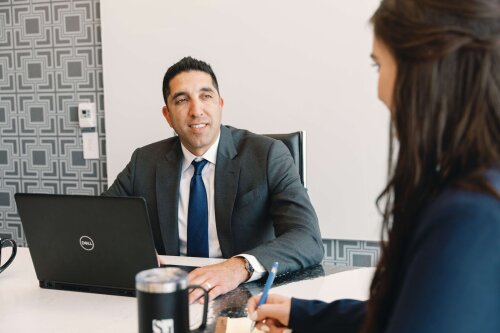Best Travel Accident Lawyers in Irvine
Share your needs with us, get contacted by law firms.
Free. Takes 2 min.
List of the best lawyers in Irvine, United States
About Travel Accident Law in Irvine, United States
Travel accident law covers legal issues that arise when people are injured or suffer loss while traveling. In Irvine, California, that includes accidents on roads, on buses, trains, taxis and rideshares, at airports or on airplanes, and on cruise ships or other vessels. The area of law blends state tort rules, insurance law, and in some cases federal or maritime law. If you are injured while traveling to, from, or within Irvine, legal rights and remedies will depend on where the accident occurred, who was at fault, what type of carrier was involved, and what insurance or contractual protections apply.
Why You May Need a Lawyer
You may want to consult a lawyer after a travel accident for several common reasons. Insurance companies often seek to minimize payouts, and an attorney can review coverage, prepare claims, and negotiate fair settlements. If fault is disputed or multiple parties are involved - for example another driver, a rideshare company, a tour operator, or a property owner - a lawyer can identify liable parties and build a case. In cases involving airlines, cruise lines, or interstate carriers, federal or maritime rules may apply and create special filing requirements. If you suffered serious injury, permanent impairment, or wrongful death, a lawyer can calculate damages, preserve evidence, and represent your interests in court if needed.
Local Laws Overview
Key legal points relevant to travel accidents in Irvine include state statutes, local enforcement practices, and special rules for specific carriers.
Statute of limitations - For most personal injury cases in California, you generally have two years from the date of injury to file a lawsuit. Property-damage claims are generally subject to a three-year limit. Wrongful-death claims usually must be filed within two years of the death. These deadlines can vary for certain claims and can be shortened further when a public entity is involved.
Government claims - If the accident involves a city, county, or other public entity, California law usually requires filing an administrative claim within six months before you can file a lawsuit. Missing this deadline can bar a suit.
Comparative fault - California follows a pure comparative negligence rule. If you are partly at fault, your compensation can be reduced by your percentage of fault, but you can still recover damages even if you are more than 50 percent responsible.
Insurance requirements - California requires minimum liability insurance for motorists. Travel-related accidents often require analysis of multiple policies - the at-fault driver’s liability policy, your own uninsured or underinsured motorist coverage, commercial carrier insurance, or special coverage for domestic and international travel. Rideshare coverage and employer-provided insurance may apply depending on the facts.
Rideshare and taxi incidents - Liability often depends on the driver’s status with the app or dispatch service at the time of the crash. Rideshare companies typically have staged policies that change coverage depending on whether the driver is available on the app, en route to pick up a passenger, or carrying a passenger.
Air and rail - Domestic airline incidents are subject to federal rules and carrier policies; international air travel may be governed by treaties such as the Montreal Convention. Train accidents involving Amtrak or interstate carriers can implicate a mix of federal and state law.
Maritime and cruise lines - Injuries on cruise ships and other vessels may fall under maritime law. Passenger contracts can include short filing deadlines, mandatory arbitration clauses, or forum selection provisions. Crew members and maritime workers may have separate protections under federal maritime statutes such as the Jones Act.
Local enforcement - If the accident occurred in Irvine, law enforcement and the Irvine Police Department or other responding agencies will prepare collision reports and may pursue traffic or criminal charges. Those reports are important evidence for civil claims.
Frequently Asked Questions
What should I do immediately after a travel accident in Irvine?
Get medical attention right away - call 911 if necessary. Move to a safe location if you can. Report the accident to local police so an official report is created. Exchange contact, insurance, and vehicle information with other parties. Take photos of the scene, vehicles, injuries, skid marks, signage and any contributing conditions. Collect witness names and contact information. Preserve records - medical bills, receipts, tickets, boarding passes, and correspondence with carriers or insurers.
How long do I have to file a lawsuit after a travel accident?
For most personal injury claims in California you have two years from the date of injury to file suit. Property damage claims often have a three-year limit. Wrongful-death suits generally must be filed within two years of death. If the defendant is a public agency you usually must file an administrative claim within six months. Because exceptions and shorter deadlines can apply, consult a lawyer promptly.
Can I sue a rideshare company like Uber or Lyft if I was injured in Irvine?
Possibly. Liability depends on the driver’s status with the app at the time and the applicable insurance coverage. Rideshare companies and drivers may both have exposure depending on whether the driver was offline, available on the app, en route to pick up, or carrying a passenger. These cases involve complex insurance and contract issues, so an experienced attorney can determine potential defendants and coverage sources.
What if the accident involved an airline, train or cruise ship?
Different rules apply. International air travel may be subject to treaty rules such as the Montreal Convention, which limits or standardizes liability. Airlines and railroads may have special procedures and deadlines for claims. Cruise lines often operate under maritime law and passenger contracts that include short filing deadlines and forum clauses. It is important to contact counsel quickly so you do not miss time-sensitive requirements.
How is fault determined in a travel accident?
Fault is determined by looking at negligence and legal duties - who failed to act reasonably under the circumstances. Police reports, witness statements, traffic camera footage, vehicle damage, skid marks, expert reconstruction, and other evidence help establish fault. California’s pure comparative negligence system allocates fault in percentages and reduces recovery by the plaintiff’s share of responsibility.
What types of damages can I recover?
You may recover economic damages such as medical expenses, lost wages, and property damage, and non-economic damages such as pain and suffering, emotional distress, and loss of enjoyment of life. In rare cases involving egregious conduct, punitive damages may be available. The available damages and how they are calculated depend on the facts and the applicable law.
What if I was injured while working and traveling for my job?
If you were an employee and the travel was work-related, workers’ compensation may apply for medical care and partial wage replacement. Workers’ compensation typically bars personal-injury lawsuits against your employer, but you may have a third-party claim against someone other than your employer if a third party caused the accident.
How do I preserve evidence after a travel accident?
Keep all medical records, bills, repair estimates and receipts. Save photos and videos of the scene and any damage. Preserve the vehicle in its post-accident condition if possible, or document it thoroughly before repairs. Ask witnesses to put their statements in writing and keep contact information. Preserve electronic evidence such as rideshare trip logs, emails, boarding passes, and any app screenshots. An attorney can help issue preservation letters to carriers or other parties.
Will my case go to trial?
Many travel-accident cases are resolved by settlement. Whether a case goes to trial depends on liability, the size of the claim, the parties’ willingness to settle, and whether insurance carriers offer reasonable compensation. If settlement is not possible, a trial may be necessary to pursue full recovery. A lawyer can evaluate the strength of your case and discuss likely outcomes.
How do I pay for a lawyer if I cannot afford one up-front?
Many personal-injury lawyers work on a contingency-fee basis, meaning they collect a fee only if they recover money for you. This arrangement allows people without up-front funds to obtain legal representation. Be sure to discuss fees, costs, and what happens if you lose the case before signing a retainer.
Additional Resources
Irvine Police Department - for collision reports and local law enforcement assistance. Orange County Superior Court - for filing civil suits and court procedures. California Department of Motor Vehicles - for driver and vehicle regulations. California Department of Insurance - for questions about insurance coverage and complaints. California Courts Self-Help Center - for basic procedural information. Federal Aviation Administration and National Transportation Safety Board - for aviation safety and investigations. California Public Utilities Commission - for regulation of certain transportation providers. National and local bar associations - for lawyer referral services and referrals to attorneys experienced in travel-accident and personal-injury law. Legal aid organizations and court self-help clinics - for limited-scope help if you cannot afford private counsel.
Next Steps
1. Get prompt medical care - Your health is the top priority and medical records are critical evidence.
2. Report the accident - Call police or the appropriate carrier and obtain an official report or incident number.
3. Preserve evidence - Take photos, save receipts, keep vehicle parts or clothing if relevant, and request the police report.
4. Notify your insurance company - Provide required notice but avoid detailed statements about fault before talking with counsel.
5. Consult a qualified attorney - Look for a lawyer experienced in travel-accident, personal-injury, or maritime law depending on the facts. Many offer free consultations and work on contingency.
6. Act quickly - Be mindful of filing deadlines and administrative claim requirements. Early legal advice helps preserve rights, protect evidence, and ensure you meet time-sensitive steps.
If you are unsure where to begin, contact the local bar association or a lawyer referral service to find an attorney who handles travel-accident cases in Irvine. A prompt review of your situation can clarify deadlines, insurance options, and the best path forward.
Lawzana helps you find the best lawyers and law firms in Irvine through a curated and pre-screened list of qualified legal professionals. Our platform offers rankings and detailed profiles of attorneys and law firms, allowing you to compare based on practice areas, including Travel Accident, experience, and client feedback.
Each profile includes a description of the firm's areas of practice, client reviews, team members and partners, year of establishment, spoken languages, office locations, contact information, social media presence, and any published articles or resources. Most firms on our platform speak English and are experienced in both local and international legal matters.
Get a quote from top-rated law firms in Irvine, United States — quickly, securely, and without unnecessary hassle.
Disclaimer:
The information provided on this page is for general informational purposes only and does not constitute legal advice. While we strive to ensure the accuracy and relevance of the content, legal information may change over time, and interpretations of the law can vary. You should always consult with a qualified legal professional for advice specific to your situation.
We disclaim all liability for actions taken or not taken based on the content of this page. If you believe any information is incorrect or outdated, please contact us, and we will review and update it where appropriate.














